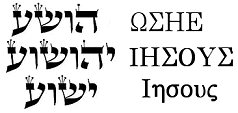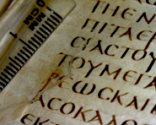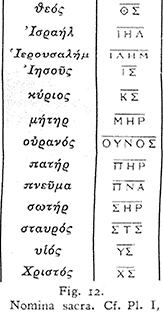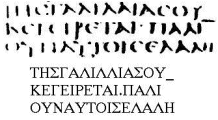|
The most important ancient targum (translation) of the Torah is the "Translation of the Seventy" (also known as the Septuagint or LXX), which was originally produced by 70 Jewish translators for Greek-speaking Jews in Egypt during the 3rd-2nd centuries B.C. Although the Septuagint is useful for doing biblical research, it must be remembered that it is a Greek translation of the Masoretic Text and therefore should not be given linguistic priority over the original Hebrew. That being said, the LXX does provide insight about how Hebrew words and concepts were translated into Koine (common) Greek for Jews of that time.
For instance, the Septuagint uses the Greek name бЊљќЩќЈѕГќњбњ¶ѕВ (pronounced yay-soos) to translate the Hebrew name "Joshua" (i.e., Yehoshua: „Щ÷∞„Ф„Х÷є„©„Б÷ї„Ґ÷Ј), a name formed through the combination of YHVH („Щ÷∞„Ф„Х÷Є„Ф) and yasha („Щ÷Є„©„Б÷Ј„Ґ), meaning "YHVH saves." Later Yehoshua was shortened to "Yeshua" („Щ÷µ„©„Б„Х÷Љ„Ґ÷Ј), though this name, too, was also translated as бЊљќЩќЈѕГќњбњ¶ѕВ in the Septuagint (1 Chron. 24:11; Neh. 8:17). Similarly, the Septuagint used the word "christos" (ѕЗѕБќєѕГѕДбљєѕВ) for the Hebrew term "mashiach" or "the anointed" („Ф÷Ј„Ю÷Љ÷Є„©„Б÷і„Щ„Ч÷Ј).
 |
Some people attempt to impugn the name "Jesus" by claiming that it is of pagan origin. For example, some claim that Greek name Iesous is derived from the name "Zeus" (ќЦќµѕНѕВ), even though it is clear that "Zeus" comes from an ancient Phoenician god named Baal Tzephon („С÷Ј÷Љ„Ґ÷Ј„Ь „¶÷∞„§„Я, i.e., "Beelzebub"). Others want to say that "Jesus" should be rendered as "YAHushua" or "YAHoshua" (or some variant thereof), appending YAH („Щ÷Є„Ф÷Љ) as part of the name, regardless of the fact that this is not attested to by any historical Hebrew usage. Contrary to this, it is clear that the original writers of the New Testament transliterated the Hebrew name Yeshua („Щ„©„Х„Ґ) as бЉЄќЈѕГќњбњ¶ѕВ [IƒУsous], in agreement with the LXX's earlier usage. Indeed many of the early "church fathers" used the name Iesous (ќЩќЈѕГќњѕЕѕВ) to refer to the Messiah. For instance Polycarp (70-155), Clement (c 96-110), Ignatius of Antioch (c 110 AD), and Justin Martyr (c. 100вАУ165) all wrote in Koine Greek and plainly used the name "Iesous" to refer to the Savior. Moreover the Didache (ќФќєќіќ±ѕЗбљі), dating from the first century AD, uses the name as well. For example: "First, concerning the cup: We thank thee, our Father, for the holy vine of David Thy servant, which Thou madest known to us through Jesus Thy Servant (бЊљќЩќЈѕГќњбњ¶ ѕДќњбњ¶ ѕАќ±ќєќібљєѕВ ѕГќњѕЕ); to Thee be the glory for ever (Did. 9:2).
 |
The fact that the Greek name for "Jesus" does not explicitly appear in the Codex Sinaticus should not cause alarm to those who understand the facts about textual transmission and the practices of the scribal arts. The ancient New Testament copyists and scribes used the nomina sacra "ќЩќ£" to abbreviate and refer to ќЩќЧќ£ќЯќ•ќ£ (i.e., Iesous, i.e., "Jesus"), thereby ascribing special sanctity to that name... Regarding the name YAHshua, on the other hand, there is simply no manuscript evidence whatsoever, nor is there any linguistic connection between Yehoshua and YAH. Beware of those people who attempt to "correct" the Name of the Savior through spurious reasoning and appeals to vanity, chaverim....
|





